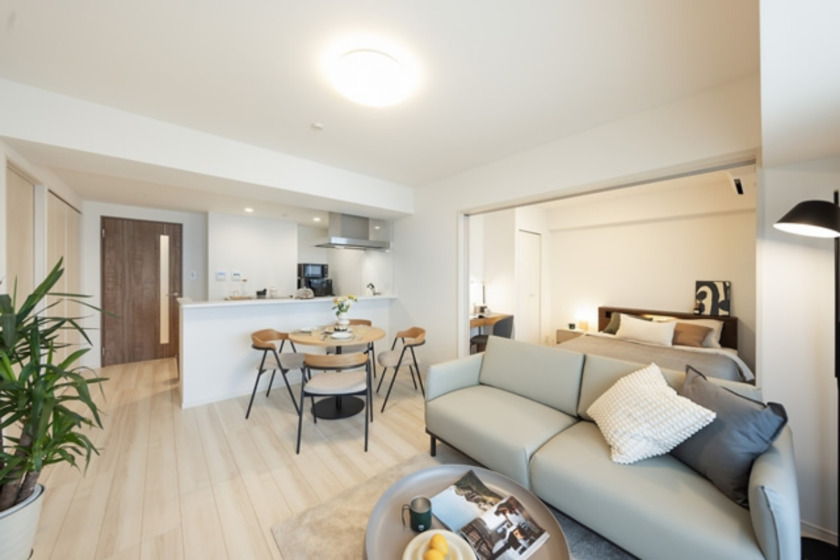Moving to Japan is an exhilarating adventure, yet the process of finding a home can often feel overwhelming, especially if you’re navigating an unfamiliar rental system. For many, the ultimate goal is to rent in Tokyo, a dynamic metropolis offering unparalleled opportunities and a unique lifestyle. This comprehensive 2024 guide is meticulously crafted to simply and safely walk you through how to rent an apartment in Japan as a foreign resident. We aim to provide you with indispensable support, ensuring your relocation experience is truly smooth and stress-free, ultimately guiding you to your ideal Japanese home.
Understanding Japan’s unique rental market
When you embark on the journey to rent an apartment in Japan, particularly in bustling urban centers like Tokyo, you’ll discover a rental system that stands apart from many Western countries. A fundamental understanding of these unique aspects is crucial for a smooth and successful housing search. Don’t let these differences become a source of stress; a clear guide will empower you to navigate them confidently.

Key terminology & initial costs: Japanese real estate transactions involve distinct terms and substantial upfront fees, typically 4 to 6 months’ worth of rent. Understanding these is vital for a truly stress-free relocation. Key payments often include:
- Reikin (Key money): A non-refundable “gift” to the landlord (1-2 months’ rent).
- Shikikin (Deposit): A refundable security deposit (1-2 months’ rent).
- Chukai Tesuryo (Agent fee): Paid to the real estate agency for their help (1 month’s rent + tax).
- Other mandatory fees: Expect lock change fees and mandatory fire insurance (Kasai Hoken). Planning your budget for these initial expenses is paramount for a truly stress-free relocation.
The guarantor system: Most landlords require a guarantor (連帯保証人 – rentai hosho-nin) legally responsible for your rent. For many foreigners, finding a personal guarantor is challenging. Therefore, utilizing guarantor companies (保証会社) for a fee (initial payment + annual renewal) is a common and safely viable solution. Their support significantly increases your chances of approval, making the rental process more accessible for non-Japanese residents.
Challenges for foreigners: Some landlords may exhibit reluctance towards foreign tenants due to perceived communication issues or cultural differences. Overcoming language barriers and cultural nuances can be daunting. This is where a multilingual real estate agency becomes an indispensable guide, bridging these gaps and ensuring mutual respect.
Preparing your documents for a smooth application
Having your complete documentation prepared in advance is critical for a smooth apartment application process in Japan. Japanese landlords require precise papers, and being prepared demonstrates your responsibility and reliability.

Personal identification & visa status: To prove identity and legal status, ensure you have your valid Passport and up-to-date Residence Card (在留カード). Your visa type also confirms your eligibility for long-term residency in Japan.
Proof of income & financial stability: Landlords require solid assurance of consistent rent payments. Prepare:
- Employment contract / Certificate of employment (在職証明書): Confirms job status and salary.
- Recent bank statements: Showing consistent income and sufficient funds for initial costs.
- Salary slips (給与明細書): Typically for the past 3-6 months.
- Tax certificates: Often for self-employed individuals.
- Note: New arrivals or students might need a sponsor, larger deposit, or flexible guarantor company requirements.
Your Japanese bank account: A prerequisite: Almost all landlords mandate rent payments directly from a Japanese bank account. Opening one can take weeks for new foreign residents, so start this process ASAP upon arrival. Without a local bank account, your application may not be accepted, making this a crucial step to simply manage your financial obligations in Japan.
Other supporting documents: You might also be asked for an Emergency Contact in Japan or a reference letter. Being prepared with these will allow for a stress-free application, moving you swiftly towards finding ideal apartments for rent in Japan.
How to rent an apartment in Tokyo: Your ideal apartment search (2024)
With market knowledge and documents ready, it’s time for the exciting next step: finding your ideal high-end apartment or comfortable home to rent in Tokyo. The vast options can be overwhelming, but with the right strategic approach and expert support, your search can be simply enjoyable and effective.

Defining your needs: Before Browse, clarify your non-negotiables.
- Budget: Your maximum monthly rent, including utilities.
- Location: Consider commute, public transport access, and neighborhood vibe. Researching Tokyo areas will guide your choice.
- Size & layout: Japanese apartments use abbreviations like 1K (1 room + kitchen), 1LDK (1 bedroom + living/dining/kitchen), etc.
- Amenities: Prioritize essentials like air conditioning, in-unit laundry space, or balcony.
Online resources with real estate agents: While major Japanese real estate websites (SUUMO, HOME’S) have extensive listings, they’re often not foreigner-friendly due to language barriers and landlord preferences. Many landlords hesitate to rent an apartment in Japan to foreigners. This is where a specialized agent is invaluable.
- The importance of a specialized agent: Agencies like Momo Estate focus on foreign residents. They have direct relationships with foreigner-friendly landlords, explain complex terms in your native language, and provide crucial multilingual support. This simply bypasses common hurdles, ensuring your experience is smooth and successful.
Smart viewing tips: When viewing, be highly observant and ask questions. Check for:
- Sunlight and ventilation: Crucial for comfort.
- Noise levels: From neighbors, street, or trains.
- Appliances and fixtures: What’s included and their condition.
- Storage space: Often limited.
- Building condition: Common areas, cleanliness.
- Proximity to transport: Exact walking distance to stations. Your agent’s insights can help highlight crucial details.
Navigating the application and screening process
Once you’ve found an apartment, the application and screening process begins. This can be nerve-wracking, involving detailed background checks and landlord approvals. Our aim is to simply your understanding and provide the unwavering support you need.

Submitting your detailed application: Your real estate agent will help you complete a comprehensive application form. This requires extensive personal, financial, and employment information (name, visa, income, employment, etc.). Ensure all details are accurate and consistent with your supporting documents before submission to the property management company or landlord.
The multi-layered screening process: Your application undergoes rigorous, multi-layered screening:
- Guarantor company screening: If using a guarantor company, they assess your financial reliability via income and background checks. This is crucial for safely securing your commitment, as they assume financial responsibility.
- Landlord/Management company screening: The landlord reviews your overall profile (stability, income, adherence to rules). Some may have unstated preferences regarding foreign tenants. The process can take days to over a week.
Tips for a successful application and dealing with rejection: Maximize approval chances by being honest, providing documents promptly, and communicating clearly. If rejected (not uncommon for foreigners, reasons rarely disclosed), don’t give up! A dedicated agent will inquire and immediately search for alternatives. This is where a foreigner-friendly agency provides significant support, ensuring your experience remains smooth through this phase.
Signing your lease & moving into your new home
Congratulations! You’ve reached the exciting stage: signing your lease and moving into your new Japanese home. This pivotal step requires careful attention, but with the right guide and unwavering support, your move-in experience will be stress-free and truly memorable.

Understanding your rental contract (Jūyōjikō Setsumei): Before signing, your agent must provide a “Jūyōjikō Setsumei” (Explanation of Important Matters). This legally required document, explained by a licensed professional, details all key terms: rent, fees, contract term (typically two years), renewal, deposit/key money policies, and tenant/landlord responsibility for repairs and rules (pets, smoking, garbage, noise). Your agent should simply explain every clause, ensuring your full understanding for Trust and mutual respect. Ask questions if unclear.
Key clauses and utility setup:
Pay special attention to:
- Contract renewal: Most agreements have fixed terms; renewal often involves an additional fee (更新料 – kōshin-ryō).
- Notice period: Typically 1-2 months’ advance notice is required for moving out.
- Pet policies: Many apartments are “no pets allowed.” If permitted, expect additional fees. Once signed, arrange utilities. Your agent can help contact electricity, gas, water, and internet providers. Plan internet installation weeks ahead for a safely connected home.
Life as a tenant in Japan: Tips for a harmonious stay
Moving into your new home is just the beginning. Life as a tenant in Japan means understanding local customs and rules for a harmonious living experience. Your responsibility extends beyond rent; it involves integrating into the community.

Navigating daily etiquette and rules: Japanese apartment buildings often have specific rules for peace and order. Be mindful of:
- Garbage disposal: Japan has strict rules for sorting and disposing of trash. Learn your area’s specific schedule and categories (e.g., burnable, non-burnable, recyclables). Non-compliance can result in fines.
- Noise levels: Walls can be thin. Be mindful of noise (music, conversations, footsteps) late at night or early morning. Consider using slippers indoors.
- Common areas: Keep shared spaces (hallways, entrances) clean and free of personal belongings.
- Neighborly greetings: A simple “Ohayo gozaimasu” or “Konnichiwa” can foster positive relationships and show respect.
Maintenance and emergency protocols: Should a problem arise (leak, broken appliance, pest issue), contact your landlord or property management promptly. An agent with multilingual support can help communicate issues, alleviating stress. For serious emergencies (fire, major leak), prioritize safety: contact emergency services (119 fire/ambulance, 110 police) immediately, then your property manager. Knowing these protocols helps you live safely and with peace of mind.
Why choose Momo Estate for your Japan rental journey
Renting an apartment in Japan, especially trying to rent in Tokyo, can feel complex, but choosing the right partner makes all the difference. Momo Estate is built specifically for foreign residents, committed to making your home-finding experience smooth and truly stress-free.
We combine local expertise with international-friendly service, offering full multilingual support in English, Japanese, and Vietnamese. Our vision is to be Japan’s most Trusted real estate agency for foreigners, upholding values of respect and simplicity. We help you find your ideal property, from high-end apartment rentals to family homes, with dedicated support from your first message to move-in. Our swift response via LINE & Messenger and high client satisfaction underscore our responsibility to guide you to a safe and comfortable new life.
Contact Momo Estate today for personalized help and make your dream move a reality.
- Address: #301, Lions Mansion Otsuka Kakuman 2-3-12 Kita-Otsuka, Toshima-ku, Tokyo
- Phone: 03-6820-6203
- Email: info@momoestate.jp
- Website: momoestate.jp
- Facebook: MOMO Estate
- Open: Monday–Saturday, 10:00–18:00
Renting in Japan can seem challenging. But with the right guide and expert support, your experience can be truly smooth and stress-free. At Momo Estate, we embody Trust and Multilingualism, working to simply complex processes and help you every step. For apartments for rent in Japan safely, reach out for personalized assistance and make your dream move a reality.




